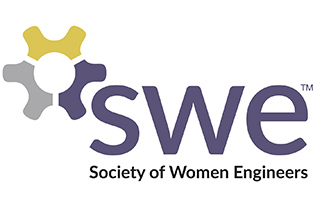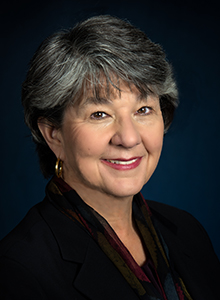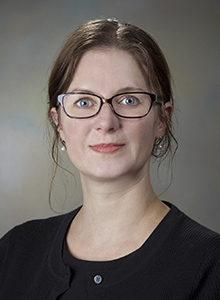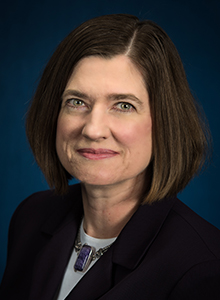Three Sandia engineers recognized by Society of Women Engineers for contributions to advancing women in STEM

Three Sandia engineers have been recognized by the Society of Women Engineers (SWE) as part of its annual awards program for their support in the enrichment and advancement of women in engineering.
- Janet Williams won the Distinguished Service Award, which recognizes members who have made significant contributions to SWE for at least 20 years, especially at the local and regional levels or on society-level committees.
- Kelly Hahn, Emerging Leader Award, which honors individuals “who have been actively engaged in an engineering or technology profession, and have demonstrated outstanding technical excellence as an individual resulting in significant accomplishments.”
- Leslie Phinney, Prism Award, honors “a woman who has charted her own path throughout her career, providing leadership in technology fields and professional organizations along the way.”
“The men and women recognized this year have made significant contributions to the engineering community,” said Society of Women Engineers (SWE) President Jonna Gerken. “They are leaders, inspiring the current and future generation of STEM professionals, and paving the way to empowerment for women engineers everywhere.”
Janet William
30 years of service, commitment

Janet joined Sandia in 1985 and served in management in corporate construction, facilities planning and project development, and infrastructure programs. In 2006, she was selected to be the site strategy manager at the Atomic Weapons Establishment in the United Kingdom. Following the two-year assignment, Janet returned to New Mexico to manage the weapons integration department before she was selected to be a senior infrastructure consultant for the National Nuclear Security Administration, or NNSA, in Washington, D.C. In this position, Janet led efforts to develop an integrated, capability-focused strategic infrastructure framework across the nuclear weapons enterprise.
Now, Janet is responsible for infrastructure and capability analysis and weapons data analysis for nuclear weapons program planning, providing support for NNSA strategic infrastructure initiatives and the congressionally mandated Stockpile Stewardship and Management Plan.
It was in her last year of undergraduate school that Janet became involved with SWE. When a position with Sandia brought her to Albuquerque, she found herself without a local society section, so she joined forces with other women engineers whose efforts led to the 1988 charter of the SWE-Central New Mexico section. In 1994 she received the Distinguished New Engineer Award and the Fellow Award in 2009.
Janet says she deeply appreciates the recognition of her contributions to the Society by her peers. “When I reflect on my career and my SWE experiences over the years, I feel that giving my time and knowledge to SWE’s goals of helping women find rewarding careers in engineering also helped me develop skills that furthered my contributions to Sandia,” she says. “The dual opportunities to encourage women engineers and to serve the nation made my Sandia and SWE experiences doubly gratifying.”
Kelly Hahn
An emerging leader in neutron diagnostic field

After joining Sandia in 2001 as a student intern, Kelly held a number of research positions working on intense electron-beam-driven radiography sources until she began working in 2010 in the neutron and particle diagnostics department, where she primarily fields several nuclear activation diagnostics to support Inertial Confinement Fusion experiments on the Z Machine.
As an expert on measuring neutron yield, Kelly was the primary scientist supporting the measurements associated with a Laboratory Directed Research and Development project to develop new physical simulation capabilities to qualify non-nuclear weapons components in radiation environments. With others across the Labs, Kelly’s expertise helped make possible new experiments to boost Z Machine’s neutron and energy output.
Kelly has a doctorate in electrical engineering from the University of New Mexico and has co-authored more than 70 peer-reviewed and conference articles, of which she is first author on 15.
She is an active and engaged member of the American Physical Society and serves on the Electrical and Computer Engineering advisory board at the University of New Mexico. Through her professors and other associates in the engineering department, Kelly learned the importance of encouraging female students of all ages, especially those in elementary and middle school, to consider engineering fields.
“I think some students, particularly females, seem intimidated by engineering fields because they are afraid to make mistakes,” Kelly says. “Everyone makes mistakes — myself included. Mistakes are an integral part of the research and development environment. By working with a team, mistakes can be remedied more quickly and that benefits the entire team.”
In her mentorship role, Kelly encourages students to be actively involved in technical areas outside of their disciplines so they can be exposed to different aspects of the research and development field.
“I am truly flattered by this award, and I feel tremendously honored that several of my respected colleagues took time to prepare sincere letters of recommendation for the award. It further boosts my interest in wanting to pay it forward to inspire other females to join STEM fields,” she says.
Leslie Phinney
Charting her path through leadership, ingenuity, and empowerment

Leslie began her career at Sandia in 2003 and has, over the course of 14 years, conducted research in the fields of heat transfer and microsystems, and advanced the knowledge in areas of thermal analysis to support national security applications, thermal property measurements, microscale heat transfer, thermal microactuators, and diagnostic techniques for microsystems.
In 2009, Sandia’s Advanced Science & Technology Division looked at improving workplace experiences by creating the Workplace Enhancement Council, a liaison group between employees and division leadership. Leslie was a founding member and its first chair. In her role, she led the conception and implementation of new hire and mentoring initiatives. She has also organized panel discussions on professional society engagement, external assignments and opportunities, and speed networking and mentoring sessions.
Leslie accepted an assignment in the Office of the Chief Technology Officer (CTO) in 2012. The Office of the CTO, together with the Research Leadership Team, is responsible for the governance and leadership of research strategy and stewardship of capabilities at the laboratories. “Passion for providing the best research environment for colleagues to thrive and succeed in” is what motivated her to accept the position. During the 16-month assignment, Leslie provided a foundation for improvement initiatives by analyzing and documenting research environment findings, activities and recommendations. Her report led to the adoption of an aspirational Ideal Research Environment description, outlined in the State of the Research Environment – 2013.
Today, Leslie is a thermal analyst working in thermal sciences and engineering. Thermal analysts supplement experimentation and testing to ensure nuclear weapons will operate reliably, and not fail, if exposed to extreme environments.
After receiving her doctorate in mechanical engineering from the University of California at Berkeley in 1997, Leslie was an assistant professor at the University of Illinois at Urbana-Champaign’s Department of Mechanical and Industrial Engineering, where she developed a new graduate course on microscale thermophysics of solids. In addition, she has co-authored two book chapters, 49 peer-reviewed journal articles and 51 papers presented at national and international conferences.
She is a Fellow of the American Society of Mechanical Engineers, or ASME, and was an associate editor for the Transactions of the ASME: Journal of Heat Transfer. She was an industrial advisory board member for Purdue University’s Cooling Technologies Research Center, chairing it in 2010.
Leslie says her belief that the community broadly encompasses where she works and lives is a driving force for her commitment to improving it. She has supported the United Way’s Women in Philanthropy for more than a decade. Her volunteer efforts have supported the Society of Women Engineers – Central New Mexico section, Sandia Women’s Action Network, New Mexico Engineering Foundation, Junior League of Albuquerque, and the Albuquerque Rose Society.
“I focus my charitable giving primarily on organizations that empower women, expand educational opportunities, assist those in need, protect the environment, and preserve important historical and cultural sites,” she says.
* * *
SWE will recognize Janet, Kelly, and Leslie at its annual event — the world’s largest conference and career fair for women engineers — Oct. 26-28, in Austin, Texas. The not-for-profit SWE was founded in 1950 and, according to its website, is the world’s largest advocate and catalyst for change for women in engineering and technology.